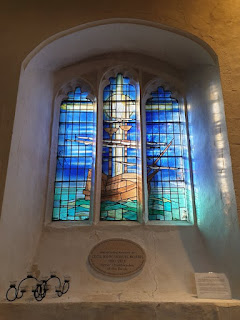God so loved - love is from God because God is love; pure love, the essence of all that love is and can be. Love that is patient, kind, not envious or boastful or arrogant or rude. Love that does not insist on its own way; is not irritable or resentful, does not rejoice in wrongdoing, but rejoices in the truth. Love that bears all things, believes all things, hopes all things, endures all things. Love that never ends.
God so loved the world - the heavens and the earth that God created in the beginning, the heavens which declare the glory of God and the sky that displays what his hands have made, humankind that God created in his own image. God saw all that he had made, and it was very good. God so loved the world that he created in the beginning.
God so loved the world that he gave – true love involves giving; in fact true love is giving. Our love is often less than this. We speak of those we love as being everything we need or as soul mates who complete us, but rarely talk in terms of giving all we have to others. Yet that is the nature of God’s love, he gives all he has to us.
God so loved the world that he gave his only Son – the Father gives us his Son and the Son gives his life, his whole life, even unto death. Yet, because Father, Son and Holy Spirit are one God, this is a way of saying that what God gives to us is himself, everything he has and is.
God so loved the world that he gave his only Son, so that everyone who believes in him may not perish but may have eternal life – God gives himself to us in order that we can become part of him and enter the very life of God himself. Jesus said he came that we might have life and have it to the full. Eternal life is the life of love that the Father, Son and Holy Spirit share within the Godhead and in to which we are called to come and share by the ever-giving love that God the Father shows to us through God the Son.
God’s love has been revealed among us in this way, that God sent his only Son into the world so that we might live through him. We live in the light of this love which reveals all that we can potentially be and become as human beings. We come into the light of Christ by comparing our lives to his.
As we do so, inevitably we find that we fall short; that our capacity to do what pleases him (by living out all goodness, righteousness and truth) is less than his capacity for these things. Generally when we make comparisons, we compare ourselves with others and so compare ourselves with those we think are worse than or similar to ourselves. We’ve all heard others and, maybe, ourselves saying ‘I’m alright, Jack!’ or ‘I’m as good as the next person, if not better!’ On the basis of these comparisons we think we are ok; at least no better or worse than others, at best, better than many others around us. On the basis of these comparisons we are comfortable with who we are and see no need to change.
In the light of the way that Jesus loved, we see our own lack of love, joy, peace, patience, kindness, goodness, faithfulness, humility, and self-control. If we say that we have no sin, we deceive ourselves, remain in darkness, and there is no truth in us. The true comparison that we make should not be with others, but with God. Jesus challenged us to ‘Be perfect, therefore, as your heavenly Father is perfect.’ On the basis of that comparison, we all fall short. As St Paul writes, ‘for all have sinned and fall short of the glory of God.’
Jesus, through his life and death, showed us the depth of love of which human beings are really capable and, on the basis of that comparison, we come up well short and are in real need of change. It is when we live in the light of Christ, seeing ourselves as we really are that we become honest with ourselves and with God. By coming into that honesty we confess our sins and are purified; as we say in this service, let us confess our sins in penitence and faith, firmly resolved to live in love and peace with all.
As we read in the first letter of John: God’s love was revealed among us in this way: God sent his only Son into the world so that we might live through him. In this is love, not that we loved God but that he loved us and sent his Son to be the atoning sacrifice for our sins. We have seen and do testify that the Father has sent his Son as the Saviour of the world. God is love, and those who abide in love abide in God, and God abides in them. Love has been perfected among us in this: that we may have boldness on the day of judgment, because as he is, so are we in this world. Beloved, let us love one another, because love is from God. The commandment we have from him is this: those who love God must love their brothers and sisters also (1 John 4. 7 – 21 abridged).
---------------------------------------------------------------------------------------------------
James Kilbane - Love Is His Way.




